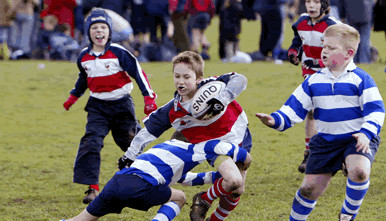
Tackling In Children's Rugby
Let me begin by acknowledging what I am not. Although I do have a medical background I do not deal with musculoskeletal trauma. I am not an expert in sports injuries and do not tend to come across them in the day to day activity of my job as a Vascular Surgeon. What I am, though, is the father of a very energetic 7 year old boy who has dreams of becoming the next Rob Kearney or Johnny Sexton.
When I expressed an interest in helping coach my son’s rugby team I was expecting to be told to help toss a ball around or slice up the half-time oranges. Instead I had to undertake a formal IRFU coaching course over a full weekend. As a parent and a medical practitioner I was pleasantly surprised to see what huge emphasis was placed on ensuring the game was as safe as possible for those participating. Prior to commencing the course I had to complete an online module on concussion. A large portion of the time on the course is devoted to teaching safe play. The various aspects of the game, tackling, scrummaging etc. are introduced on a phased basis as young players progress. They learn to tackle properly at a young age so that as the game becomes more “high-impact” as they mature they do so safely. They learn good habits early. Rugby is a physical game. It is a contact sport. Yes, the players get injured. Just as they do in hurling, horse riding, athletics, indeed virtually every sport one can think of. My son could be injured in the schoolyard, he could be injured in a car accident. Risk of injury is something we all live with every day. I cannot wrap him in cotton wool, nor do I want to. What I can do is teach him the skills necessary to minimise that risk.
In my opinion, banning children from tackling in rugby would produce a whole spate of different injuries in older players as they are now forced to learn to tackle when they are older and the game is faster and more physical. It is undoubtedly better for them to learn to tackle properly in a “low-pressure” environment when they are younger and the game is slower. This makes identification and correction of actions which might lead to injury much easier for those of us involved in coaching. We all know it is not easy to teach an old dog new tricks! What has my son got out of playing rugby? Apart from the obvious benefits of physical activity and expending his seemingly limitless amounts of energy in a healthy fashion, he has learned other skills. He has learned how good it is to belong, to be part of a team. He has learned what it feels like to have others rely on you and to rely on them too. He has learned what it feels like when his actions lead to the team losing as well as them winning. He has learned responsibility. He has learned to share. He has learned respect for his coaches, his team-mates and the authority of the referee. Playing rugby has helped my son grow up and I have no doubt that the “life-skills” he has learned as part of playing rugby will stand to him for far longer than the playing skills I am trying to help teach him. In my opinion, as his parent, these benefits far outweigh the risks of injury. The most pertinent fact here is that my son enjoys playing rugby. His week revolves around it. As his Dad I am delighted that he has found such a healthy outlet. I would much rather this than to find him glued to a TV or computer screen all day long. The day my son tells me he no longer enjoys playing rugby and wants to give it up is the day he stops. I am not expecting to hear that any time soon.
--
5yWhat a great read :)
Business Development Manager
5yThe rules should change to an obligation on the ball carrier to run at / into the space rather than seek contact. Children do this naturally. Statistics prove it is the tackler who is most often injured rather than the ball carrier.
Sales Director, Argon medical
5yGreat comments Ciaran and all. I totally agree, as a former rugby player and also a father of a very energetic 7year old who plays rugby I was amazed they don’t tackle until 9years of age. They play with Velcro tabs which must be ripped off. They become so focused on these tabs they don’t think of body positioning at all and I've seen some significant collisions. If they were taught to tackle from an earlier age there focus would be on better body positioning therefore avoiding upright collisions reaching for these tabs. I appreciate the dangers of tackling however surely it’s better to teach this technique from an earlier age when the velocity of the tackle is much lower.
Commercial Manager at Birds Eye UK
6yWell said!
Channel Marketing Lead at Solventum | Driving Growth in Drinking Water Industry
6yMy son plays rugby too, he started when he was 5, he is 8 now and is starting to learn tackling, it's a worry as a mum, but also as your article says Ciaran he has already learnt so much more. A bunch of friends, respect, belonging, team dynamics, empathy and of course how to win and lose gracefully! A great sport for all sizes and shapes, including girls too.